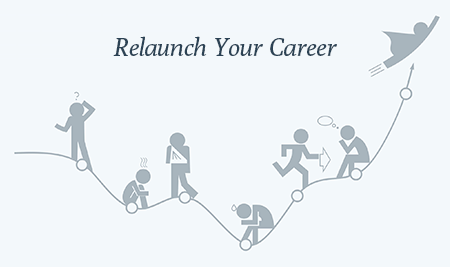“You know what? I’m 40 now and I need to find a new career. But how do I do that at this age?”
With young children and aging parents to care for, Julie was made redundant from her job at age 40. She was retrenched and felt ashamed as if she had done something wrong. “The redundancy hit me emotionally,” says Julie who previously worked in HR for a multinational company.”
“I suddenly felt useless”. She knew that going back to work would be difficult because recruiters are not looking at candidates over a certain age as they are sometimes considered obsolete.
In an uncertain economy, that can happen to anybody and it takes an emotional toll on your confidence.
Julie is not alone. There are lots of people in their 40s and 50s who were made redundant. Once they found themselves at a crossroads in their career, they didn’t know which way to go.
It is really hard when it hits you at a certain age because there are so many options and opportunities for the younger generation, but not as much for those over 40 or 50. But it’s essential to get back on track with a new career and a career coach can help you with that.
Executive Coaching can help you gain confidence and show you the way forward. Executive coaching can be your lifeline in times of redundancy or when it’s just time to change course, learn a lot about yourself and repurpose your skills.
“Having an emotional support person to help me work through my emotions and get my focus back on track was a wonderful thing,” says Julie, “It also helped that I knew they had been there before and could give me advice on how to get back into employment.”
No matter if you were made redundant or made a conscious career change at age 40, career change can be difficult. Here are 7 steps you can take to find your confidence and get back on track.
Plan out what is important in life

Ask yourself if your current job aligns with this list of things that matter most. If not, it may be time for something new. A career coach will help with your personal assessment and guide you through career options that may be more aligned with what matters most to you.
Define your transferable skills
 What transferable skills do you have to bring with you? They can be any transferable skills that are transferable from your previous job. Transferable skills are any skills you possess that are useful to employers across various jobs and industries. These might include skills such as teamwork, communication, organisation, adaptability or other qualities employers look for in strong candidates.
What transferable skills do you have to bring with you? They can be any transferable skills that are transferable from your previous job. Transferable skills are any skills you possess that are useful to employers across various jobs and industries. These might include skills such as teamwork, communication, organisation, adaptability or other qualities employers look for in strong candidates.
Don’t be afraid to explore career options
 There are many jobs for someone with your skills and experience – you just need to find the right one. Many people are hesitant to make a career change because they fear it may be too difficult or take too much time. Making a career change is undoubtedly scary, with huge repercussions that impact your peer group, your potential for promotion, and the trajectory of your career.
There are many jobs for someone with your skills and experience – you just need to find the right one. Many people are hesitant to make a career change because they fear it may be too difficult or take too much time. Making a career change is undoubtedly scary, with huge repercussions that impact your peer group, your potential for promotion, and the trajectory of your career.
Stop making excuses
 When things get hard, we usually come up with excuses —even if this means being miserable. When you know that the fear is only trying to protect you from failure, then you can just go ahead and do it. The only way to grow is to overcome our fear and self-doubt. You can come up with a number of excuses such as “What if I send 100 resumes out and don’t get a single interview?”, “What if I am too old for this job?”. Well, if you don’t try you will never know.
When things get hard, we usually come up with excuses —even if this means being miserable. When you know that the fear is only trying to protect you from failure, then you can just go ahead and do it. The only way to grow is to overcome our fear and self-doubt. You can come up with a number of excuses such as “What if I send 100 resumes out and don’t get a single interview?”, “What if I am too old for this job?”. Well, if you don’t try you will never know.
Remember, you can listen to your inner voice, but it does not control you. Here are some tips by Lisa Vermaak to help you cope with the overwhelming emotions when unemployed.
Polish your resume
 Your resume and a cover letter are the first touching point for a potential employer. While this is a wide topic itself, here are some tips on how to stand out with your resume –
Your resume and a cover letter are the first touching point for a potential employer. While this is a wide topic itself, here are some tips on how to stand out with your resume –
- Make sure you take the time to highlight your career goals as well as relevant skills that are transferable to a target job position. List relevant skills that are transferable to the job description in an organized list with bullet points or numbers before listing them individually on the resume itself if needed.
- Always include the company name and position you’re applying for in a resume objective.
- Use keywords from the job posting when writing. Sometimes employers and recruitment agencies use software to shortlist applicants and it’s important to use keywords they’re looking for in order to be recognized.
Personal Branding and Styling
Personal branding and styling are important factors to success and confidence. Personal styling is a factor that can be easily overlooked, but there are so many reasons why it’s an absolute must for personal branding as well as success in the workplace. Having your hair done, nails painted or even just wearing clothes you feel good about yourself will boost your self-confidence and make you more confident on the job interview. Professional coaches may help you with styling and personal branding, but there are some simple styling tips to improve your personal brand.
- Get a haircut that is flattering for the shape of your face and style it with a product to keep it looking neat throughout the day
- Create a signature colour palette or go monochrome as this will look chic every time you wear it
- Find clothes that you not only feel good in but are also appropriate for your work environment.
- It is important to keep up with trends but also wear clothing which suits your body shape, so don’t feel like you need to buy all new clothes every season because
Upskill and retrain
 If you are thinking about changing a career out of necessity, you are not alone. There are more than 134,000 Australians in their 40s studying according to statistics. It is not uncommon for people in their 40s who have changed careers to need to retrain or learn new skills. Studying at 40 doesn’t mean studying full time. It may be a short course or an online course. A career coach can help steer you in the right direction by helping you find the best course to meet your career goals.
If you are thinking about changing a career out of necessity, you are not alone. There are more than 134,000 Australians in their 40s studying according to statistics. It is not uncommon for people in their 40s who have changed careers to need to retrain or learn new skills. Studying at 40 doesn’t mean studying full time. It may be a short course or an online course. A career coach can help steer you in the right direction by helping you find the best course to meet your career goals.
Changing careers can be a huge decision, particularly if you feel like you may not have the opportunity or drive to change again in your 40s or 50s.
About Robbie Moore, guest contributor
 Robbie Moore is a Founder and Managing Director of Huddle Career Consulting. Robbie is a problem solver at heart. After experiencing life after redundancy himself, Robbie is on a mission to help senior executives in their late 40s with smooth career transition.
Robbie Moore is a Founder and Managing Director of Huddle Career Consulting. Robbie is a problem solver at heart. After experiencing life after redundancy himself, Robbie is on a mission to help senior executives in their late 40s with smooth career transition.




